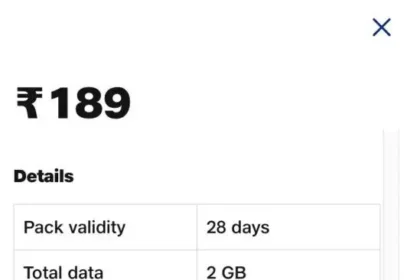India’s telecom landscape is set for a fresh showdown between two global giants. Two good examples of such companies are Mukesh Ambani’s Reliance Jio and Elon Musk’s Starlink. The centre of this conflict is HOW the satellite spectrum will be let out.
Musk’s Starlink satellite broadband is all set, aiming to capture the Indian market, and so far, Reliance Jio has been the market leader for a long period. The stakes rise high, with billions in investments and control of the market at the line of contention.
Its consequences will not only affect the two companies but also define the future of the Indian technical and telecommunications market and the measures of the government to adjust the satellite spectrum.
The Spectrum Debate: A Strategic Move by Reliance Jio
India’s telecom minister, Jyotiraditya Scindia, recently said that, as per global practice, India’s government would allocate satellite spectrum administratively. Still, the last notification will be given once they have received feedback from the telecom regulator, the TRAI (Telecom Regulatory Authority of India).
This has stirred up a lot of controversy, especially with Ambani’s Reliance Jio calling for an auction of the spectrum rather than an administrative assignment.
Owned by Asia’s richest man, Mukesh Ambani, Reliance Jio has been the market leader in India since its launch in the fourth quarter of 2016. It has disrupted the market with reasonable and cheap data rates and has grown its services relentlessly within the United States.

But Ambani’s Reliance Jio worries that when spectrum for satellite communication is to be provided administratively, Musk’s foreign competitors in Starlink can do so without having to buy expensive spectrum in auctions.
During a recent open house with TRAI, Ravi Gandhi, who is currently an executive at Reliance Jio, called on the government to change its strategy. He maintained that the administrative manner of awarding spectrum is “the most discriminatory way of distributing any form of government asset” if such a move were to be adopted to compel foreign players while discriminatively locking out local players such as Jio.
Musk’s Starlink: A Growing Threat
On the other hand, Musk’s Starlink, which is its subsidiary of SpaceX, has long been keenly interested in the Indian market. Starlink, which now has a fleet of over 6,400 satellites in orbit around the earth, has been able to offer low-latency broadband services to customers in other parts of the world, including Africa.
This success has been quickly followed by some curiosity from Musk’s company towards India, a country of over a billion people, with the majority of them still in need of affordable and constant connection to the Internet.
Another crucial factor towards the realisation of Musk’s possibilities is the possibility of providing low-cost broadband. This was evidenced by Starlink, a company established in Kenya where the price to access the satellite internet is a meagre $10, a figure drastically lower than the $120 being charged in the United States.
Such low prices have made Starlink an attractive difference in emerging markets where affordability is a considerate aspect. The effect of this pricing strategy has been realised in some nations, such as Kenya, whereby local telecom providers have noted that Starlink’s pricing is disruptive.
The Impact of Administrative Spectrum Allocation
So much of the discussion about the availability of satellite spectrum in India is not restricted to Reliance Jio & Starlink. For instance, Ambani’s Reliance Jio, who would spend $19 billion to corner the Indian telecom market via auctions of airwaves, is apprehensive an administrative allocation of the spectrum for satellite services would allow foreign players like Musk’s Starlink to enter the market without the same investment.
The situation is critical for Reliance Jio as the market landscape in India has suddenly changed, and competitors such as Airtel, Idea, and Vodafone have consolidated into a single player.
Jio today controls the mobile broadband service of the telecom industry of India, and now it is on the verge of being threatened by satellite internet operators. If Starlink can provide broadband services at a cheaper rate than traditional telecom companies, then Ambani’s Reliance Jio will lose both data and voice subscribers to Musk’s space internet firm.
The Growing Demand for Satellite Internet in India
India is a very large country with a complex geographic landscape that makes it difficult to lay down traditional broadband infrastructure, particularly in the rural and less populated regions of the country.
Satellite internet can provide low-delay internet connections in a vast territory, which may significantly transform the internet connection in the country. This is where Starlink sees a loophole in its competitors.
Starlink, Musk’s space internet company, is another project that seeks to close the digital divide by providing average Internet across various parts of India where internet connectivity is a challenge.
On the contrary, Reliance Jio already gained a strong footing in the broadband segment when it entered the market. However, its main emphasis has been on 4G and 5G networks, which are rather favourable for growing the already congested urban markets.
Challenges: A new threat appears in the form of satellite-based Internet that may pose a danger to Jio as new technologies emerge and newer networks like 5G and 6G are on the horizon.
Spectrum Auction vs. Administrative Allocation
The current topical issue, therefore, revolves around the appropriateness of the spectrum auction as against administrative allocation in India. A spectrum auction is an auction where companies are allowed to bid for the rights to use certain frequencies, often, it means having to invest heavily.
In turn, this method is believed to be less favourable and closer to competitiveness and fairness in the sense that better technologically and resourceful companies are likely to be awarded the spectrum.
On the other hand, the administrative allocation which the Indian government is in favour of is one where the government hands out the spectrum to companies selected according to some criteria. Sin embargo, esto lleva no efectos de hacer el proceso más fácil y accesible, ha creado preocupaciones en lo que concierne a equidad y el favoritismo.
For Reliance Jio, a spectrum auction would be possibly more favourable.: Provider Type Impacts An analysis of each provider type would reveal that for Reliance Jio, a spectrum auction would possibly be more favourable.
The company has already made investments in hundreds of billions of dollars in spectrum for their telco operations, and an auction of satellite spectrum will force competitors such as Starlink to do the same. The overture of four satellites would do this and help maintain their competitive advantage in the newly emerging market with Ambani’s Reliance Jio.
Musk’s Starlink has supported administrative rationing, as the official stated that it is a “proactive” process of allocation and would enable Starlink and similar outfits to provide services.
Parnell Urdhwareshe, a Starlink India executive, said a structural model would allow the government to improve network readiness and achieve its vision for the future of the nation, providing better internet services across the territory.
The Global Context: Musk’s Approach vs. Ambani’s Vision
It is important to note that the competition between Ambani’s Reliance Jio and Musk’s Starlink doesn’t only happen in India. Two of them have opted for the harsh approach of trying to have a big share of the market within a short period.
As for Ambani’s Reliance Jio, the company recently made a name for itself by providing ultra-low-cost data services, including times when Ambani gave data for free in order to pen customers in.
Likewise, Musk’s Starlink has been accused of providing service at almost half the standard prices in places such as Kenya, which has set its prices much lower than those offered in the developed markets.
However, this kind of pricing strategy has raised eyebrows among local competitors. For instance, Safaricom spoke ill of regulators and pressed the point that Starlink should only offer services through a local carrier partner. This could be the warning that Reliance Jio may have to face in India if Starlink has been providing broadband at such stingy prices.
The Road Ahead for India’s Satellite Internet Market
The recommendations regarding spectrum are still pending from the TRAI, and they are expected to come out with frequencies in the next few weeks, which will go a long way in defining satellite internet services in India.
Who wins the spectrum war between Ambani’s Reliance Jio and Musk’s Starlink remains to be seen depending on how the government wants to allocate spectrum in the future, assuming the one adopted aligns well with India’s interest in boosting internet access and telecom market competition.
The future of the next few months shall prove critical for Reliance Jio as it delivers its plans to safeguard its investments and its operations within the Indian telecom industry.
Elon Musk’s Starlink threatens to alter the existing landscape as the company has brought about unique solutions for the internet connection problems in India. In any case, the fight between these two billionaires over satellite internet will be one to watch in the coming years.
For further information on how TRAI impacts telecom policies in India, click here. Readers who are also looking at cheap mobile plans and the latest telecom news, check out here.








